
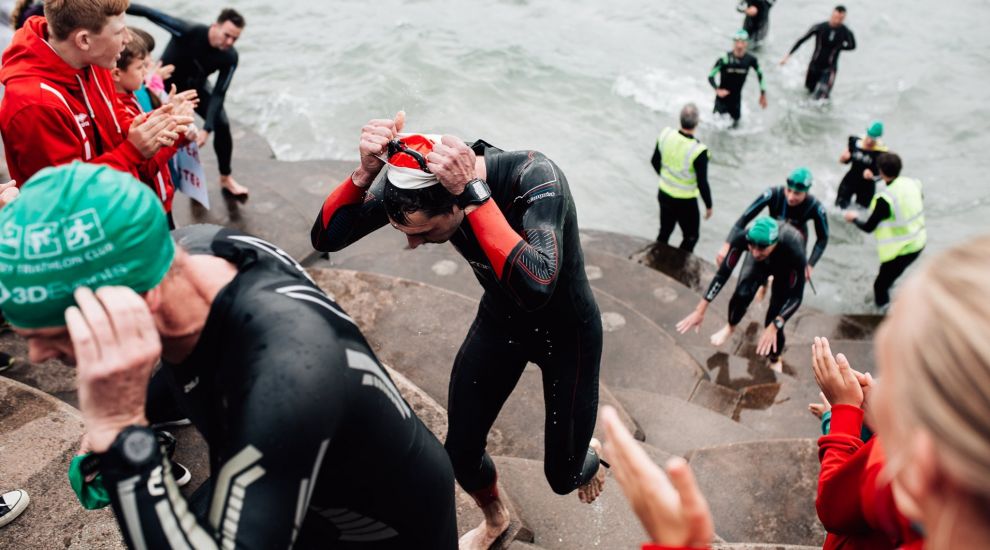

Agriculture, tourism, finance... and now sport? Find out how this emerging sector is giving islanders - and the economy - a good workout.
London 2012 fired the starting pistol on fitness becoming properly fashionable.
Brits might have already been trainer-equipped, but statistics suggest that contagious Olympics fever was what pushed them to dust them off, tie the laces and sprint towards embracing sporting spirit.
What followed was the post-80s normalisation of spandex (aka. the 'athleisure' trend), Fitbits and PT appointments becoming the latest accessoires de mode, the explosion of smoothie stores and healthy hang-outs, and many ditching lazy citybreaks for calorie-crunching international marathon opportunities.
It's that attitude shift that has since grown the UK's wellness market by £5billion to a predicted £23billion next year.

Pictured: The growth of the UK sports market. (Statista)
Jersey might not have been the first to clinch the emerging sector, but is now shaping up to become a leader with an enticing offering for both spectators and participators.
Ahead of the Super League Triathlon later this month, Express investigates the ways sport is giving the economy a workout...
It was a bold attempt to banish a "hazy headache" with a "freezing" plunge that led award-winning travel blogger Virginia Stuart-Taylor into Jersey's "choppy" seas.
Having visited in her early teens on a work trip with her mother, the 30-year-old behind The Well-Travelled Postcard fondly remembers visiting a land with an "intriguingly foreign feel" due to its "French road names and different money" in which she "bought a vast amount of pearls" and enjoyed "some fantastically sunny cliff walks."
Her second visit, however, cranked up the adrenaline several gears.
View this post on Instagram
Pictured: Blogger Virginia's second trip to Jersey was rather more sporty than her pearl-gathering first...
Feeling the aftermath of New Year "festivities" on the Isle of Wight, Virginia and her friends took to the chilled waters as an attempted cure.
"Inspired by our brisk dip, we hatched a plan to do a triathlon. One of my friends had recently moved to Jersey, and his suggestion of the Jersey Triathlon instantly appealed, both as a great excuse to visit the island, and also as we'd be swimming in the actual sea, rather than in a lake or pool, like most mainland triathlons," she recalls.
"The fact that Jersey is so accessible, with cheap and frequent flights across the whole of the UK, meant the distance wasn't a deterrent at all."
It wasn't London-based Virginia's first foray into sport tourism – "I've been a 'marathon tourist' for a few years now. I love using races as an excuse to explore somewhere new," she admits – but it was her inaugural triathlon.
Arriving on island shores in June, the otherwise easy-going yet eager civil servant-by-day was nervous.
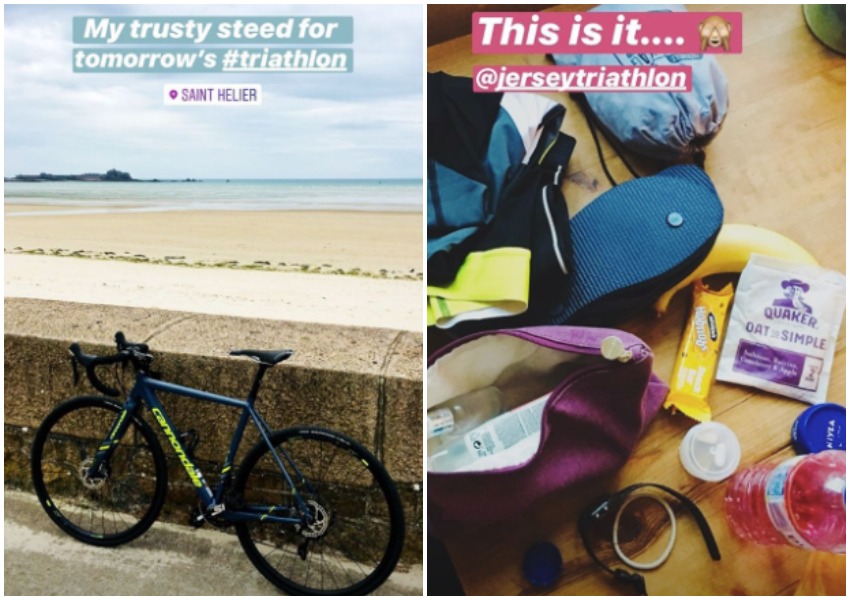
Pictured: Virginia documented her Jersey Triathlon efforts on Instagram.
"I hadn't been able to practice any sea swimming in advance, and I hadn't used my bike before (which I rented from the lovely guys at Big Maggy's)."
Those waves of trepidation were unfortunately matched with 1,500metres of rough sea to battle against on the day – "an exercise in sea survival."
But soothing landscapes for the eyes and body were fortunately to be found in the exploration of Jersey's "deserted rural roads" during the 40km cycle and 10km run that followed.
The racecourse's surrounds were the true draw, it seems, leaving her with a yearning to return: "I would like to see more of the island by bike generally, as there are beautiful bays, villages and coastlines at every turn, and blissfully little traffic."
While Virginia's trip might have been hungover happenstance, hers is exactly the experience VisitJersey is hoping to generate for many more visitors.
Enter the 'runcation' – the trendy new way to holiday, which has offered the island's tourism body a fresh path to securing a new demographic.
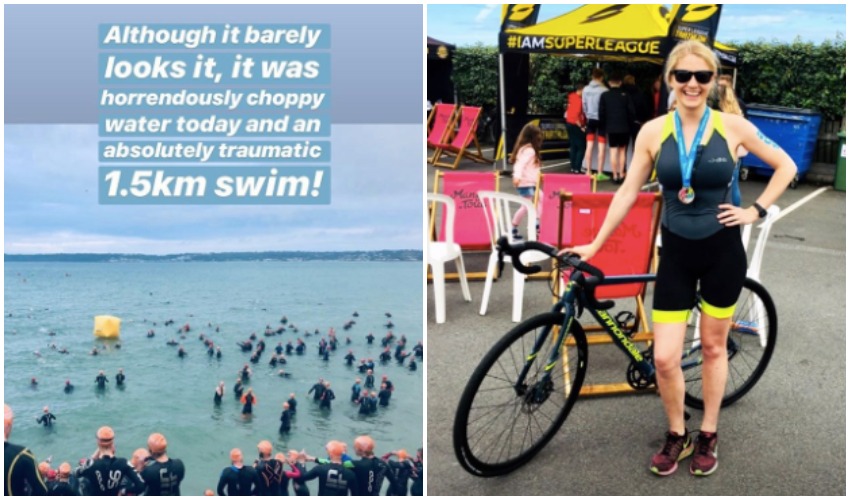
Pictured: A smiling Virginia after she completed the triple-sport challenge, which included a swim through "choppy" waters.
A recent Visit Jersey newsletter went so far as to describe the island as "a mecca for sporting events", framing it as a "different" destination able to break through the "big city marathon" social media spam.
Other marketing materials, meanwhile, are peppered with synonyms for "extreme", "adventure" and "challenge", images of kayaking and SUP, and accounts from local activity influencers including rock climber Eleanor Lister and cross-channel swimmer Sally Minty-Gravett MBE, as well as 'beard'-ed international endurance adventurer Sean Conway, who was invited to spend 48 hours exploring the island.
Together, all of this paints Jersey, with its wild coastal heights and sweeping bays, as an alluring outdoor gym for the fitness fanatic.
It's a savvy tactic.
Research from Visit Britain has shown a leaning towards experiential getaways, with domestic and international visitors increasingly drawn to locations offering "a sense of excitement, newness, freshness" and opportunities to get "out of one's comfort zone".

Pictured: 'Runcations' and competitive sport-filled stays are becoming more popular with visitors. (Studio_M)
That feeling isn't market-specific. Consider the recent 48.2-mile TMF Island Walk, for example – it attracted participants from as far afield as the USA, Australia, the Netherlands, Germany and Belgium.
And there's another positive economic consequence: sporting visitors tend to stay longer and spend more.
The rule similarly applies to spectator sports (trips in Britain average 3.63 days), as Jersey Reds' Chief Executive Mark Morgan attests.
The rugby club's pro squad – known as the "first team" – have 16 home games per season, drawing in crowds of around 1,650.
"Depending on the side that's coming over, there can be significant numbers of visitors. Coventry was our final game last season, and we estimate we had about 800 visitors that came to watch that game – people from the mainland," Mark explains.
"They don't come in on a Saturday morning and fly out on a Saturday evening... They tend to stay in nice hotels, they tend to spend good money. What also we find – we can't quantify this, although it's frequently heard – is the number of people that come here for a rugby weekend love the place and then come back for a proper holiday... It's very clear we are a strong selling agent for the island."
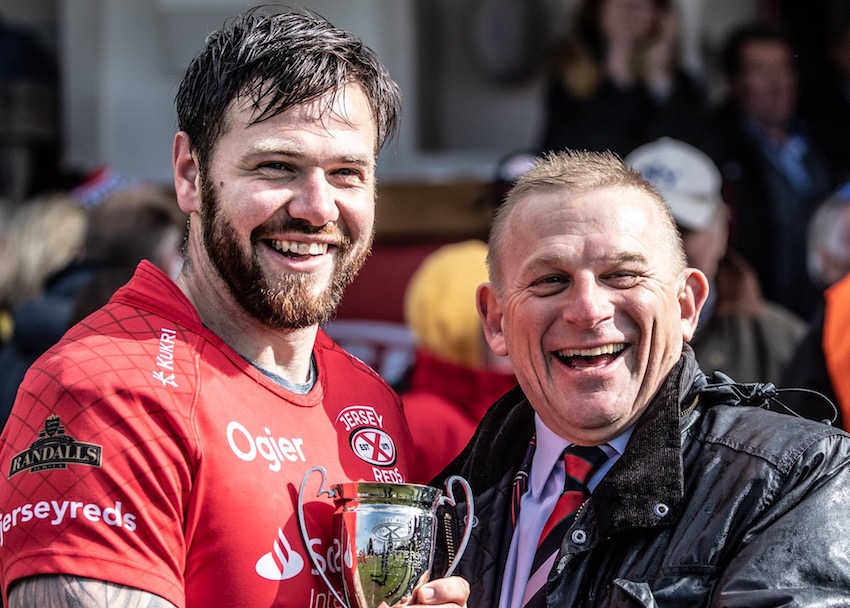
Pictured: Chair Mark Morgan presenting the 'Supporters' Player of the Season' trophy to Aaron Penberty on the day of the Siam Cup. (Jersey Reds)
Rugby also responds to the conundrum of keeping tourism profitable year-round.
"If you talk to any restaurateur, hotelier, cab driver or publican, you'll find that through the winter months, when, remember there's not a lot of holidaymakers, rugby visitors keep all those businesses really active indeed... In certain cases, it means we can actually keep the hotels open during the winter."
Airlines, too, receive a boost.
In addition to travelling pros, the main amateur team have 12 away games ("That means there are 24 flights throughout the winter that are carrying 30 people over and above normal traffic"), the women's team have 10 away, there's a veterans tournament each October, and there are five child age groups that play in leagues on the mainland.
"If you start to think about how many people are just using the planes during the winter, this is helping keep the airlines keep flying as many flights as they do."
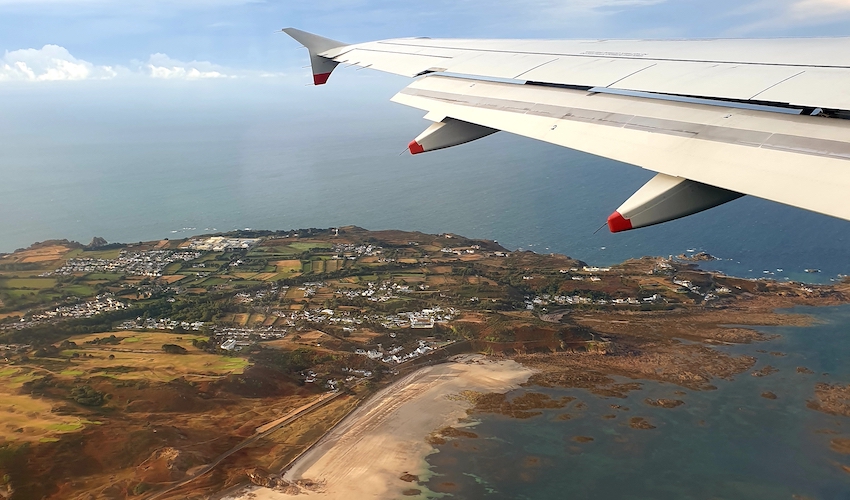
Pictured: Airlines receive a boost from travelling sports teams, keeping vital travel routes busy.
Mark says Jersey Reds aren't looking to grow any further themselves, but have been helping develop the sector as a whole by offering advice to the newly-formed Jersey Bulls football team, which aims to penetrate and rise up the English league structure.
Nurturing the industry also means more local job opportunities – Jersey Reds, for example, employs around 50 people.
It's no wonder, then, that the recently-released Government Plan makes a financial commitment to supporting professional rugby in Jersey, which it estimates brings in £2.1million a year, as well as other sporting events.
Spectator sports could also positively impact the public purse by influencing islanders to take their fitness into their own hands, thereby reducing Health's spend on weight-related problems.
Jersey Sport has been focusing on achieving that goal with youngsters – of which one third are obese by the time they leave primary school – but also those within the predominantly sedentary corporate sector.
To that end, CEO Catriona McAllister has been promoting the incorporation of showers and changing facilities into new office buildings to encourage employees to mirror business activity with physical.
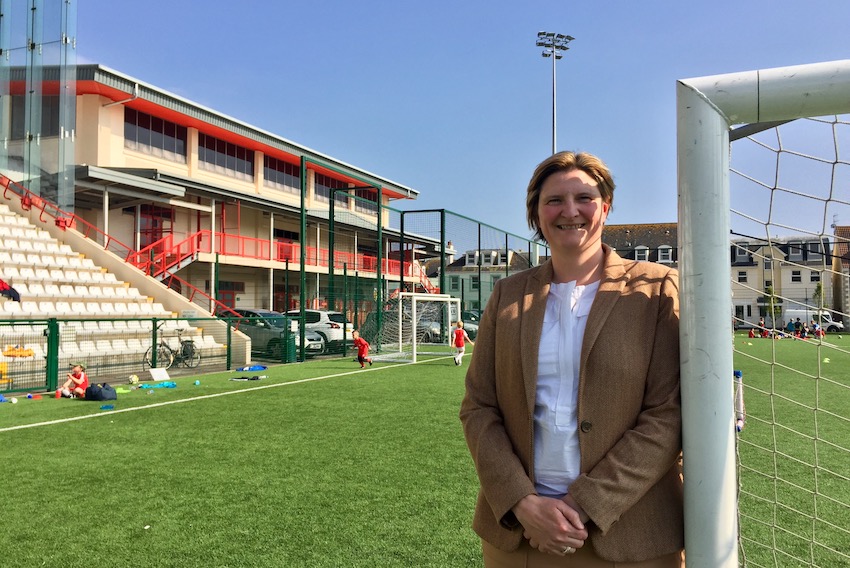
Pictured: Jersey Sport CEO Catriona McAllister has promoted the inclusion of showers in office spaces to encourage sports activity among workers.
It's that same group that Club Soulgenic aims to reach.
The Union Street-based wellness centre was set up by Glenda Rivoallan, who opened up 200 fitness clubs in the UK before moving to Jersey, where she founded Healthhaus.
With a desire to continue "pressing the envelope in fitness" and keep Jersey on track with modern developments, she sold her shares in the boutique members club and spa, opening the doors to Soulgenic last year.
The "holistic" brand aims to unite the "pillars of wellbeing" – fitness, nutrition, mind-body and general health – and therefore provides access to 15 practitioners as part of its "all-under-one-roof" approach, catering to the time-poor corporate market by choosing a concept and location that "fit seamlessly into working life."
"The idea is that someone can come in, have a fantastic workout, have an amazing healthy lunch, and also squeeze in a very short physio appointment at the same time. If they want to relax here, they can go and see the beautician," Glenda enthuses.

Pictured: Glenda Rivoallan, the brains behind Soulgenic.
Soulgenic also responds to the market move towards group fitness – a dynamic that, "retains customers for as much as four times longer than the traditional gym," according to the entrepreneur – while attempting to build work-out trends of its own. Take 'Gears and Gloves', for example – a box and cycle fusion unique to Soulgenic.
What many don't realise, however, is that the 10,000sqft gym space is actually secondary to the "key" element of Soulgenic: an app featuring regularly updated exercise and nutrition tutorials based on local expertise.
"The club was essentially a head office for the app. Because of my operational background, I decided to make it a working club, but we do all our filming [with Slingshot Films] here for the app."
It's early on in its journey, but the app has already gained corporate attention.
The Co-operative was the first to partner with Soulgenic, giving its 1,000 employees access to the platform to support staff wellness.
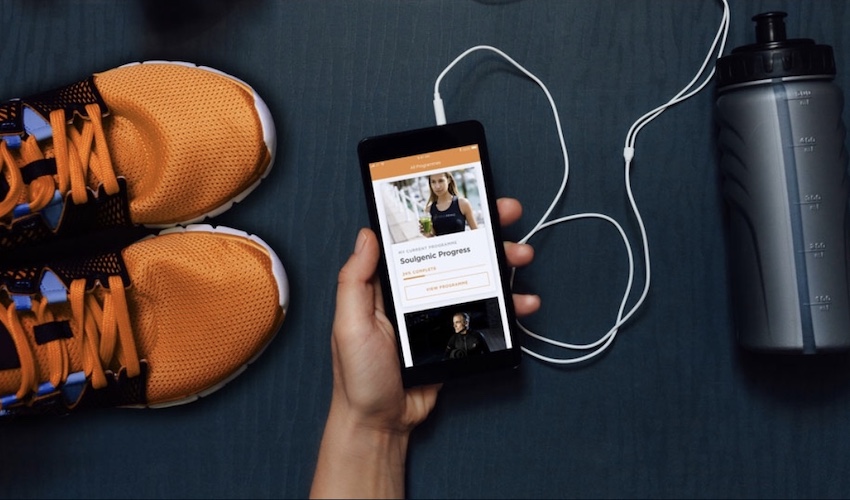
Pictured: At the heart of the Soulgenic brand is its app.
At the time, Digital Jersey, CEO, Tony Moretta had high praise for the new company: "It's innovative, it creates local jobs and it works with other established local businesses. It's a win-win for our economy."
Soulgenic has since attracted the attention of high-profile investors, last month securing £500,000 funding from Aaron Chatterly (FeelUnique), Richard Goulding (Play.com) and Nigel Le Quesne (JTC), who want to help take it global.
The next steps, Glenda says, will be continuing to solve the "challenge" of peddling the concept to potential downloaders – "We're selling hard work, right?" she jokes – and ensuring that, once the app's in their pockets, they stay engaged.
"We're working really hard with our development team to look at consumer behaviour. We want it to become a second-nature thing that people do as part of their daily routine. The key work that we're doing now is, 'How does the app integrate seamlessly into that person's day?' So, for example, it might be that Alexa will tell you, 'You haven't done Soulgenic yet,' because you usually do it at 12:00."
If it succeeds in its international mission, Soulgenic could help with efforts to put the island on the map as a wellness destination.

Pictured: Promoting exercise among sedentary office workers can enhance productivity, Glenda says.
On a local level, Glenda envisages benefits beyond mere weight loss.
Endorphin-generating exercise can benefit workers' mental health, counteracting productivity losses in the form of the two extremes of absenteeism and presenteeism.
"For the price of a cup of coffee per month, you could give a solution to your employee database that's all about boosting their happiness, which will boost productivity and bottom-line KPIs."
An attractive proposal indeed – particularly considering Jersey's productivity has plummeted by as much as a quarter since the economic crisis, which has left the government on the lookout for solutions.
However, of all the reasons to support the growth of the fitness economy, there's one draw that, in the current semi-apocalyptic climate, might just top them all.

Pictured: A buoyant sports scene could help the island amid the challenges of Brexit.
In contrast to the major economy drivers of finance and retail, a report by Ukactive and accountancy firm Mazars predicts that sport will be one of the few sectors that "won't be thrown off course by the choppy waters of Brexit."
So, beyond providing more ways for islanders to be able to buckle their belts a little tighter or shrink into summer swimsuits, investing in sport could, in fact, keep the whole economy in shape.
This article first appeared in Connect Magazine, which you can read in full by clicking here.
Pictured top: 2019 Accuro Jersey Triathlon athletes making their way out of the water following the swimming part of their challenge. (Studio_M)
Comments
Comments on this story express the views of the commentator only, not Bailiwick Publishing. We are unable to guarantee the accuracy of any of those comments.